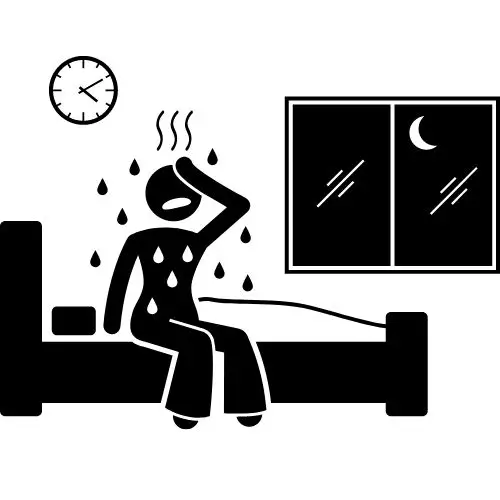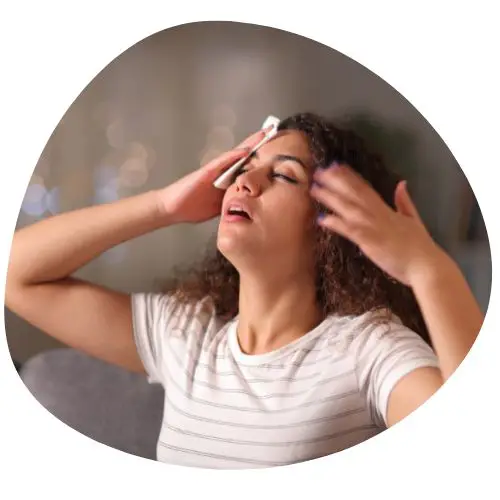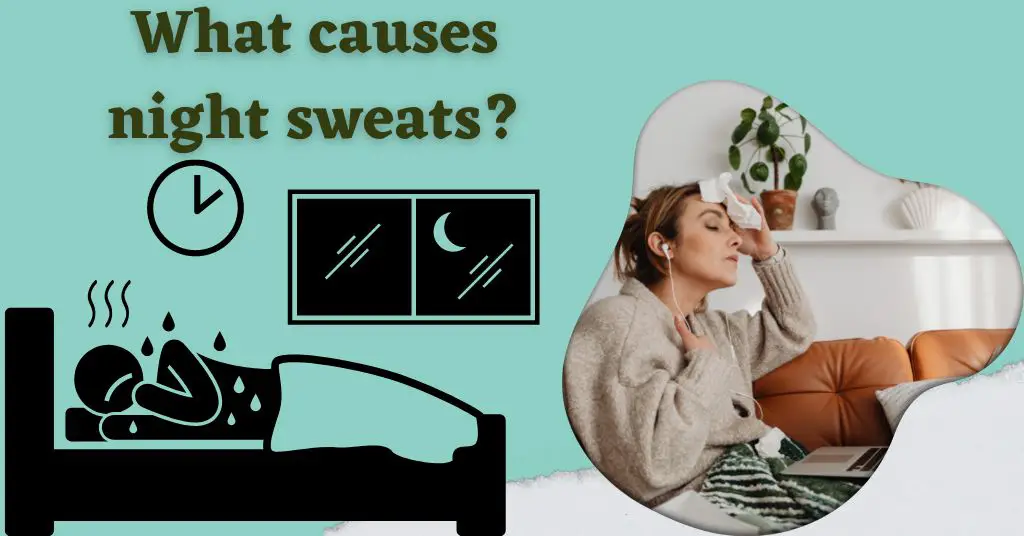Night Sweats

Night sweats, also called sleep hyperhidrosis, is a condition in which a person sweats excessively at night. The sweating can be so severe that it results in wet sheets and clothing. Night sweats can occur during any stage of sleep, but they are most common during the initial deep sleep cycle.
They are often accompanied by feelings of intense heat and a sense of being flushed. Night sweats can disrupt sleep, cause fatigue, and lead to problems with concentration during the day.
What causes night sweats?
Causes of night sweats in women

A night sweat, also called “night sweats” or “nocturnal hyperhidrosis”, is a fairly common occurrence in women. Causes of night sweats in women can be caused by:
- While night sweats are often considered a symptom of menopause, they can also be caused by other conditions and factors in women of any age.
- Night sweats can be a sign of an underlying medical condition, such as an infection, cancer, or hormonal imbalance.
- Certain medications, including antidepressants and birth control pills, can also cause night sweats.
- Alcohol and caffeine consumption, as well as smoking, can increase the risk of experiencing night sweats.
- Excessive sweating during the day can also lead to nighttime sweating.
- Sleeping in a too-warm room or wearing heavy bedding can make it difficult for the body to cool down at night and contribute to sweating.
Causes of night sweats in men

There are many potential causes of night sweats in men. Some common causes include infection, medication side effects, hormonal changes, and cancer. Infection is one of the most common causes of night sweats in men.
It can be caused by bacteria, viruses, or parasites. Medication side effects are another common cause of night sweats in men. Many medications can cause this problem, including antibiotics, antidepressants, and blood pressure medications.
Night Sweats Q&A
A: Are night sweats normal? For the most part, yes. Night sweats are a common occurrence in people who are going through menopause and can also be a symptom of other medical conditions. However, if you’re experiencing night sweats accompanied by other symptoms, such as excessive fatigue, fever or weight loss, it’s important to see your doctor to rule out any underlying health issues.
A: There is no one definitive answer to whether or not night sweats are a sign of cancer. However, there are some cancers that can cause night sweats as a symptom. Cancers that may cause night sweats include lymphoma, leukemia, and breast cancer. If you are experiencing night sweats and have any other concerning symptoms, it is important to see a doctor to determine the cause.
A: There is a lot of conflicting information out there about whether night sweats are a sign of diabetes. Some people say that if you’re sweating at night, it’s definitely a sign that you have diabetes. Others say that night sweats can be caused by many different things, and aren’t necessarily a sign of diabetes.
So what’s the truth? Are night sweats a sign of diabetes? The answer is: it depends. In some cases, night sweats may be a sign of diabetes. But in other cases, they may not be related to diabetes at all.
If you’re having trouble sleeping because you’re sweating so much at night, it might be worth checking with your doctor to see if you could have diabetes.
A: Night sweats can be a sign that you’re losing weight. This happens when your body starts burning fat for energy. While this can be a good thing, it can also lead to some unwanted side effects, such as night sweats. If you’re sweating at night and noticing a significant change in your weight, talk to your doctor to find out if there’s something else going on.
A: When night sweats stop, it can be a relief. For some people, this means that they no longer have to worry about waking up in a sweat every night. It can also mean that they don’t have to worry about the uncomfortable feeling of being hot and sweaty all the time.
There are a few things that you can do to help make sure that your night sweats stop. First, you should make sure that you are staying hydrated. You should also try to keep your room cool at night. If possible, try to sleep in a cool room without any extra blankets or covers.
If you are still having problems with night sweats, you may want to consider talking to your doctor. There may be something that is causing your night sweats and your doctor can help you find a solution.
A: When night sweats stop, it can be a relief. For some people, this means that they no longer have to worry about waking up in a sweat every night. It can also mean that they don’t have to worry about the uncomfortable feeling of being hot and sweaty all the time.
There are a few things that you can do to help make sure that your night sweats stop. First, you should make sure that you are staying hydrated. You should also try to keep your room cool at night. If possible, try to sleep in a cool room without any extra blankets or covers.
If you are still having problems with night sweats, you may want to consider talking to your doctor. There may be something that is causing your night sweats and your doctor can help you find a solution.
